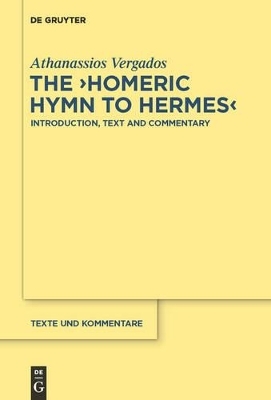
The "Homeric Hymn to Hermes"
Introduction, Text and Commentary
Seiten
| Ausstattung: Hardcover & eBook
2013
De Gruyter
978-3-11-916570-9 (ISBN)
De Gruyter
978-3-11-916570-9 (ISBN)
- Titel leider nicht mehr lieferbar
- Artikel merken
The series publishes important new editions of and commentaries on texts from Greco-Roman antiquity, especially annotated editions of texts surviving only in fragments. Due to its programmatically wide range the series provides an essential basis for the study of ancient literature. In der Reihe werden wichtige Neuausgaben und Kommentare zu Texten der griechisch-römischen Antike publiziert, insbesondere kommentierte Ausgaben nur fragmentarisch überlieferter Texte. Ihrem umfassenden Charakter entsprechend leistet die Reihe einen wesentlichen Beitrag zur Erschließung der antiken Literatur.
The Hymn to Hermes, while surely the most amusing of the so-called Homeric Hymns, also presents an array of challenging problems. In just 580 lines, the newborn god invents the lyre and sings a hymn to himself, travels from Cyllene to Pieria to steal Apollo’s cattle, organizes a feast at the river Alpheios where he serves the meat of two of the stolen animals, cunningly defends his innocence, and is finally reconciled to Apollo, to whom he gives the lyre in exchange for the cattle. This book provides the first detailed commentary devoted specifically to this unusual poem since Radermacher’s 1931 edition. The commentary pays special attention to linguistic, philological, and interpretive matters. It is preceded by a detailed introduction that addresses the Hymn’s ideas on poetry and music, the poem’s humour, the Hymn’s relation to other archaic hexameter literature both in thematic and technical aspects, the poem’s reception in later literature, its structure, the issue of its date and place of composition, and the question of its transmission. The critical text, based on F. Càssola’s edition, is equipped with an apparatus of formulaic parallels in archaic hexameter poetry as well as possible verbal echoes in later literature.
The Hymn to Hermes, while surely the most amusing of the so-called Homeric Hymns, also presents an array of challenging problems. In just 580 lines, the newborn god invents the lyre and sings a hymn to himself, travels from Cyllene to Pieria to steal Apollo’s cattle, organizes a feast at the river Alpheios where he serves the meat of two of the stolen animals, cunningly defends his innocence, and is finally reconciled to Apollo, to whom he gives the lyre in exchange for the cattle. This book provides the first detailed commentary devoted specifically to this unusual poem since Radermacher’s 1931 edition. The commentary pays special attention to linguistic, philological, and interpretive matters. It is preceded by a detailed introduction that addresses the Hymn’s ideas on poetry and music, the poem’s humour, the Hymn’s relation to other archaic hexameter literature both in thematic and technical aspects, the poem’s reception in later literature, its structure, the issue of its date and place of composition, and the question of its transmission. The critical text, based on F. Càssola’s edition, is equipped with an apparatus of formulaic parallels in archaic hexameter poetry as well as possible verbal echoes in later literature.
Athanassios Vergados, Ruprecht-Karls-Universität Heidelberg, Germany, andNational and Kapodistrian University of Athens, Greece.
| Reihe/Serie | Texte und Kommentare ; 41 |
|---|---|
| Zusatzinfo | Includes a print version and an ebook |
| Verlagsort | Berlin/Boston |
| Sprache | englisch; Greek, Ancient (to 1453) |
| Maße | 155 x 230 mm |
| Themenwelt | Geisteswissenschaften ► Sprach- / Literaturwissenschaft ► Latein / Altgriechisch |
| Schlagworte | Dichtung • Greek • Griechisch • Hermes • Homeric Hymns • Homeric Hymns; Hermes; Poetry; Greek; Religion • Homerische Hymnen • Poetry • Religion |
| ISBN-10 | 3-11-916570-0 / 3119165700 |
| ISBN-13 | 978-3-11-916570-9 / 9783119165709 |
| Zustand | Neuware |
| Haben Sie eine Frage zum Produkt? |